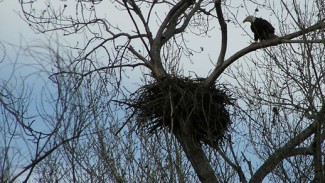Respect Wildlife
One of the great things about our forest is the wildlife. But it's important to respect wildlife - the forest is their home. Seeing wildlife can be enjoyable with proper care.
Bald Eagles

January through July is the bald eagle nesting season. Early in the nesting season, you may see the eagles repairing their nest and participating in courtship behavior. Once the eggs are laid, they will be incubated for approximately 35 days before the chicks hatch. While both adults share in the incubation duties, the female generally does most of the incubation. Once hatched, the chicks remain in the nest for approximately 12 weeks before they begin to fly on their own.
Eagle observers are reminded that state and federal laws protect bald eagles and their nest sites. Disturbance around the nest could cause the birds to abandon the nest or discourage them from using the nest in the future. Please enjoy them from a distance. One of the best areas for eagle viewing is on the Pit Arm of Shasta Lake. Anyone observing eagles building a new nest should contact the Shasta-Trinity National Recreation Area Biologist Todd Johnson at (530) 242-5550.
Bear Aware

Bear canisters are a great way to protect your perishables at campgrounds and while backpacking
- To ward off bears, keep your campsite clean
- Do not leave food, garbage, coolers, cooking equipment or utensils out in the open
- Store smellies in bear canisters or campsite provided bear boxes, not in your tent. Even toothpaste and soap may potentially attract bears.
- Remember that bears are potentially dangerous and unpredictable - never feed or approach a bear.
Wildlife Best Practices
Keep your distance
- Maintain a safe distance between you and the animal.
- Use a flashlight at night - many animals feed at night and the use of a flashlight may warn them away.
Don't feed any wildlife
Many human foods are not good for wildlife, and wildlife that becomes accustomed to being fed by people will associate you with being a food source. This can bring unwanted, destructive and even dangerous behavior for people recreating in the forest.
Watch out for bugs
- Hornets, bees, wasps, and yellow jackets are a problem at many campsites.
- Wear light-colored clothing and avoiding perfumes or colognes to avoid attracting stinging insects.
- Do not wave wildly and swat insects blindly - instead use a gentle pushing or brushing motion to deter them.


